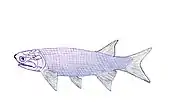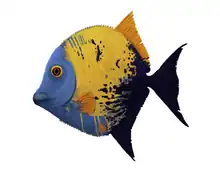Sargodon
Sargodon is an extinct genus of neopterygian ray-finned fish that lived during the Middle and Late Triassic epochs in what is now Europe.[1]
| Sargodon Temporal range: | |
|---|---|
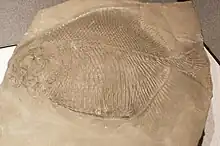 | |
| Fossil | |
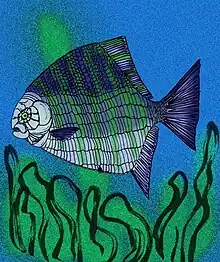 | |
| Artist's reconstruction | |
| Scientific classification | |
| Kingdom: | |
| Phylum: | |
| Class: | |
| Order: | |
| Family: | |
| Genus: | †Sargodon Plieninger, 1847 |
| Binomial name | |
| †Sargodon tomicus Plieninger, 1847 | |
Occurrence
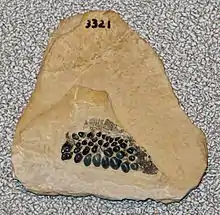
Isolated tooth plate from Cene, Italy
Fossils of Sargodon tomicus are found in rocks of Ladinian (late Middle Triassic) to Rhaetian (latest Triassic) age. Remains have been described from Austria (Lower Austria, Vorarlberg), England, Italy (Campania, Lombardy), Germany (Baden-Württemberg), Poland (Tatra Mountains) and Switzerland (Graubünden).[1][2] It is known from both complete specimens, which could reach body lengths of about 1 m (3.3 ft), and isolated dental plates that provided a triturating surface, suggesting that these animals fed on shelled organisms.
References
- Romano, Carlo; Koot, Martha B.; Kogan, Ilja; Brayard, Arnaud; Minikh, Alla V.; Brinkmann, Winand; Bucher, Hugo; Kriwet, Jürgen (2016). "Permian-Triassic Osteichthyes (bony fishes): diversity dynamics and body size evolution". Biological Reviews. 91 (1): 106–147. doi:10.1111/brv.12161. PMID 25431138. S2CID 5332637.
- Latimer, A. E.; Giles, S. (2018). "A giant dapediid from the Late Triassic of Switzerland and insights into neopterygian phylogeny". Royal Society Open Science. 5 (8): 180497. Bibcode:2018RSOS....580497L. doi:10.1098/rsos.180497. PMC 6124034. PMID 30225040.
This article is issued from Wikipedia. The text is licensed under Creative Commons - Attribution - Sharealike. Additional terms may apply for the media files.
